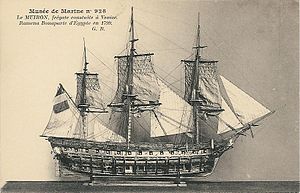HMS Carrere (1801)

1/72 Scale model of the Carrère's sister ship, the Muiron, on display at the Musée national de la Marine
|
|
| History | |
|---|---|
|
|
|
| Name: | Carrère |
| Namesake: | Colonel Carrère |
| Builder: | Venice |
| Laid down: | 1789 |
| Launched: | 20 August 1797 |
| Completed: | November 1797 |
| Captured: | By the British on 3 August 1801 |
|
|
|
| Name: | HMS Carrere |
| Acquired: | 3 August 1801 |
| Fate: | Sold on 1 September 1814 |
| General characteristics | |
| Class and type: | 36-gun frigate |
| Tons burthen: | 1013 (bm) |
| Length: | 151 ft (46 m) |
| Beam: | 39 ft 6 in (12.04 m) |
| Sail plan: | Full-rigged ship |
| Complement: |
|
| Armament: |
|
| Armour: | Timber |
Carrère was a French frigate that served briefly in the French navy before the British captured her in 1801, naming her HMS Carrere. She seems never to have seen any meaningful active duty after her capture as she was laid up in 1802 and finally sold in 1814.
Carrère was one of two 38-gun frigates that were building on the stocks in Venice in May 1797, when Napoleon took the city during the Campaign of Italy.Pierre-Alexandre Forfait ordered the two frigates completed, which they were in August 1797 under the names Carrère and Muiron. The French named Carrère after an esteemed artillery colonel who had fallen at Unzmarkt fighting the Austrians.
Carrère and Muiron both served during the French invasion of Egypt in 1798. They then accompanied Napoleon on his return to France after the failure of that campaign. The captain of the Carrère was Commodore Pierre Dumanoir le Pelley, and with him travelled generals Lannes, Murat, and Marmont.
The British Pomone of 48 guns, in company with Phoenix and Pearl, captured Carrère near Elba on 3 August 1801 after a short fight. She was escorting a small convoy from Porto Ercole to Porto Longone during the Siege of Porto Ferrajo. Pomone lost two men killed and four wounded, of whom two died later. The French casualty list was not initially available.
The Royal Navy took her in as HMS Carrere, but rated at 36 guns.Frederick Lewis Maitland was her first captain. He sailed her to Portsmouth, where she arrived on 24 September 1802.
...
Wikipedia
